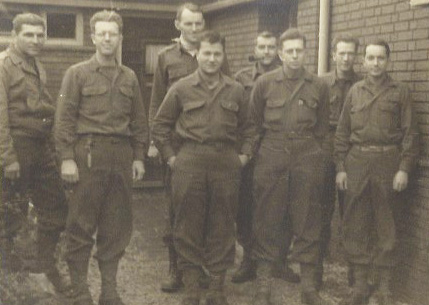When Captain Harry L. Jackson landed in France five days after D-Day, the special services officer with the 120th Infantry Regiment, 30th Infantry Division had yet to encounter the worst of his war experiences. His tour, however, was preceded by lengthy service in the National Guard and, after his unit was activated, by duty at stateside camps and by training at Officers’ Candidate School at Fort Benning, Georgia and Special Services School at Washington and Lee University. His training groomed Jackson to be responsible not only for a variety of tasks but for coordinating the activities of his staff to best serve the needs of soldiers and civilians caught in the European theater of war.
Jackson learned that military life was more than the receipt of and obedience to unfathomable orders and meaningless procedures; rather, leading and motivating others required skills that were necessary in any well-functioning organization, military or civilian. Included in his papers, part of the Manuscripts & Folklife Archives of WKU’s Library Special Collections, is a two-page list of 28 points summarizing the “Management of the American Soldier.” Among the items of advice:
Treat the American soldier as a man; look him squarely in the eye when you talk to him and treat him justly.
Give short talks to men on subjects which they ought to know. Be sure the talks are short. Have something to say; say it; then stop.
Be extremely careful about your manner in dealing with soldiers; they are entitled to a respectful and patient hearing. Some officers seem to go on the theory that military efficiency consists in a loud voice and an impatient manner.
[Soldiers] respect and admire an officer who requires a strict performance of duty. The true rule for handling soldiers is: Don’t nag them; don’t neglect them; don’t coddle them.
Look carefully after the company mess. Much of the discontent in a company is founded upon dissatisfaction with the food and the way it is served.
Be an optimist; cultivate that habit.
Remember Napoleon’s maxim, that in war the moral is to the physical as three to one.
There is always something to be done; the efficient officer sets to work earnestly and loyally to do it, overcoming obstacles as he goes along.
Prohibit the use of dirty, vulgar language – Punish offenders and see that your instructions are carried out.
This last admonition was, perhaps, more honored in the breach than the observance, as indicated by the motivational techniques of another officer whose words were also preserved in Captain Jackson’s papers. A week before D-Day, legendary General George S. Patton gave a speech to the men of the Third U.S. Army. Here is some of what he had to say by way of motivation (edited for PG-13):
Death must not be feared. Every man is frightened at first in battle. If he says he isn’t, he’s a #&%@# liar.
All through your army career you men have bitched about what you call “this chicken$#&* drilling.” That is all for a purpose. Drilling and discipline must be maintained in an army, if only for one reason: INSTANT OBEDIENCE TO ORDERS AND TO CREATE CONSTANT ALERTNESS. I don’t give a damn for a man who is not always on his toes.
An army is a team. Lives, sleeps, eats, fights as a team. This individual heroic stuff is a lot of crap.
Why, by God, I actually pity those son-of-a-$%&# we’re going up against. By God, I do.
Every man in the army plays a vital part. Every little job is essential to the whole scheme. . . . Even the Chaplain is important for if we get killed, and he was not there to bury us, we’d all to go to Hell.
Sure, we will all want to go home. We want this thing over with, but you can’t win a war lying down. The quickest way to get it over with is to get the #%&$#&. The quicker they are whipped, the quicker we go home.
Thank God that at least, 30 years from now when you are sitting around the fireside with your grandson on your knee, and he asks you what you did in the Great World War II, you won’t have to say, “I shoveled #&$@ in Louisiana.”
Click here to access a finding aid for the Harry Jackson Collection. For more World War II collections, search TopScholar and KenCat.

